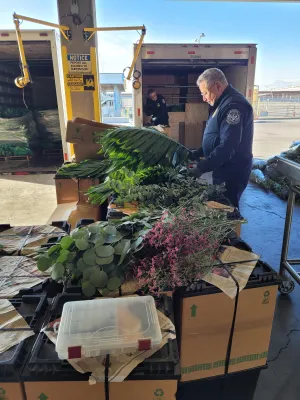
EL PASO, Texas – The days on the calendar approaching Valentine’s Day are being crossed off day by day and U.S. Customs and Border Protection (CBP) Agriculture Specialists will be ready to conduct inspections of flowers coming in through the ports of entry. Cut flower arrangements are a popular gift brought in from Mexico.
“We encourage all travelers who plan to cross the border with Valentine’s related flowers and goods t to consult the CBP website to learn more about rules and regulations,” said CBP El Paso Director of Field Operations Hector Mancha. “This is one of the busiest times of the year for flowers and CBP agriculture specialists are working hard to prevent potentially harmful plant pests and foreign animal diseases from entering the U.S.”
Individuals who are considering purchasing floral arrangements or cut flowers in Mexico for transport to the U.S. should advise their florist so prohibited plant cut flowers will not be used in the arrangement. Some of the popular prohibited cut flowers and greenery include all chrysanthemums (crisantemo), choisya, murraya (mock orange), cedar, and juniper. In addition, all plants and seeds for planting plus popular seasonal fresh produce such as mango, oranges, mandarins and grapefruit are not allowed entry into the U.S. for personal use.
Additional prohibited items include all products containing pork, raw poultry, and fresh eggs. CBP agricultural specialists diligently conduct examinations every day preventing plants pests and disease from invading U.S. agriculture and natural resources.
U.S. Customs and Border Protection is reminding the traveling public to declare all plants, flowers, groceries, prepared foods, medication, alcoholic beverages, and spirits. Undeclared prohibited item may result in a penalty.
For more import and travel information visit DontPackAPest.com or CBP.gov.
Follow CBP El Paso Field Office on Instagram @dfoelpaso or on X @DFOElPaso







